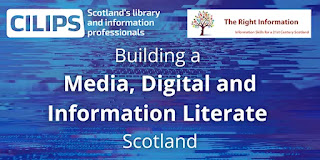Recordings and presentations from the LILAC 2022 conference (held in April) are available at https://www.lilacconference.com/lilac-archive/lilac-2022-1
There are the pre-recorded videos of keynotes:
- Susan Connor, Ray Smith (he/they), Imogen Webb (she/her), Rachel Wilding (she/her) (Manchester Metropolitan University’s iSchool) - Student Panel
- Marilyn Clarke (Director of Library Services at Goldsmiths, University of London) - Decolonisation as a means to creating an equitable future
- Emily Drabinski (Critical Pedagogy Librarian at the Graduate Center, City University of New York) - Structure and Power: Information Literacy for Liberation
There are links to presentation slides, as follows:
- Augustine, K. & Hollcraft, J. Implementing the question formulation technique in a first-year composition course throughout the pandemic
- Bagger, A., Ramsgaard, L. & Tang, H. Educational design patterns: going beyond the classic information literacy concept
- Belantara, A. & Drabinski, E. Sharing information literacy concepts through sound: sounding the radical catalog
- Beveridge, L. Dyslexia creativity and information seeking: how can academic librarians acknowledge neurodiversity in their information literacy practice?
- Bickley, R. Information literacy as activism: standing up to the academic e-book industry
- Brittle, K. & Newbigging, C. Are you a teaching librarian? How two ‘imposters’ grew a library help centre
- Brookbank, E. Serving and supporting students as whole people
- Cannon, P. Exploring how university lecturers construct their knowledge of information and digital literacy and what that means for teaching in universities moving forward
- Connell, B. Designing information literacy materials using student voice - building self directed blended learning programme for lifelong learning students Institute of Technology Carlow
- Dawes, L. & Anaya, T. Is hybrid here to stay? Developing flexible instruction that support community inquiry and active learning
- Dunlop, S. The future of feedback: evaluation of information and digital literacy teaching in higher education
- Flood, J. & Coxhead, B. Critical sustainability research workshop: an example from UAL Libraries' Sustainability Toolkit
- Goldstein, S., Secker, J. & Harding, A-L. MILA Framework workshop
- Hamlett, A. Laying the foundation how faculty led IL instruction improves students success
- Harding, A-L. Introducing information literacy at the House of Commons
- Haworth, A., Grant, V., McIndoe, S., Sadler, R. & Taylor, D. Moving forward as one University: the impact of reshaping information and digital literacy to integrate with refreshed graduate attributes
- Howard, H. & Phillips, M. Transitioning from academia to the workplace: information literacy experiences of business students
- Inskip, C., Hicks, A., Lloyd, A., Mckinney, P. & Walton, G. Leveraging information literacy: mapping the conceptual influence and appropriation of information literacy in other disciplinary landscapes
- Jenkins, R., Love-Rodgers, C. & Dozier, M. Librarian consultations - supporting student researchers in the hybrid world
- Kaufmann, K. Factors that impact the relevance of information literacy to college students: the kaleidoscope effect
- King, M. Inclusive teaching practices to improve the learning experience for neurodivergent learners: practical strategies from the perspective of a neurodivergent librarian
- Lapham, J. The value of librarian -led information literacy lessons for higher education students in the further education college environment
- Lincoln, H. & Chiu, T. Perceptions of the ‘find it out yourself method’: developing self efficacy and students as tourists in academic communities of practice
- Long, J. & Hicks, J. Maker literacy: connecting IL within the maker movement
- Love-Rodgers, C. & McDonald, S. L. Catapulted by COVID: hitting new information literacy targets at the University of Edinburgh
- Maniates, R. Revisiting the one-minute paper: personal reflections student engagement and assessing the assessment
- Maybee, C. & Kaufmann, K. Information literacy: elements of a maturing discipline
- McAndrew, E. Wikipedia student activism and the Ivory Tower
- Mckinney, P. & Webber, S. Using theories of change to evaluate information literacy initiatives - this presentation isn't linked on this site, but you can find it here ;-) https://www.slideshare.net/sheilawebber/using-theory-of-change-to-evaluate-information-literacy-initiatives
- Minta, L., Gregory, N. & Thompson, E. Breaking out of the library bubble: information literacy and curriculum alignment
- Morrison, C., Secker, J., Wakaruk, A. & Gareau-Brennan, C. COVID and the copyright literacy community of practice
- Naughton, J. & Robertson, S. Turning a challenge into an opportunity: health literacy training for NHS knowledge and library staff
- Newnham, P. Information literacy and the transition to university education. Reflections and initial findings from Lancaster University Institute of Curriculum Enhancement (ICE) fellowship research project
- Nierenberg, E. & Dahl, T. I. The development of students as information literate individuals: results from an 86% complete PhD in information literacy
- Panes, M. & Mellifluo, L. Community building in complex settings: exploration based on Swiss multi-library initiatives for gamifiers
- Pavey, S. Looking for information literacy in the English National Curriculum and exam syllabi
- Pavey, S. What if no-one had information literacy skills?
- Penton, S. Using educational technology to convey complex Information Literacy topics: animating OSCOLA referencing and copyright
- Peppard, C., Parkhill, S. & Chalkley, A. Self service or checkout confusion?
- Phillps, K. & Joel Burkholder, J. A wolf in sheep’s clothing: genre confusion and Fake News
- Preest, K. & Sewell, C. Increasing inclusivity: developing a HEA accredited teaching course for librarians
- Randall, S., Naylor, N. & Wills, D. Trusted information in unprecedented times: reflecting on two years of learning from the PIF TICK trust mark for health information
- Secker, J., Tilley, E., Mizrachi, D. & Grim, G. Students academic reading and information literacy in a time of COVID
- Soderman, J. The power of collaging in unlocking research topics
- Thomson, K. Teaching how to structure literature reviews via 1990s movies
- Thorpe, C. & Paterson, F. Supersize my session. Reflections on redesigning a small scale workshop for a large scale setting in-person and online
- Trowell, C. & Meehan, L. Reuse recycle repurpose - moving from a plagiarism guide to a sustainable good academic practice toolkit
- Usova, T. Teaching data visualization as a one-credit course
- Walsh, A. Changing signature pedagogies for information literacy
- Walton, G. Tailoring information literacy instruction using the information discernment diagnostic questionnaire
- Walton, G. Mainstreaming information literacy: analysing Educational Preventing Violent Extremism programmes (EPVEs)
- Wegener, D. Information literacy in Asia: the case at the Singapore Institute of Technology
- Westbury, M. & Hicks, A. JIL: Getting your writing groove back
- Whitworth, A. Information in isolation: the arrival of high speed internet in a very remote country
- Williams, J., Hicks, A., Baer, A., Hollister, C. & Westbury, M. Prioritising Inclusion and Equity in Information Literacy Scholarship: A Panel Conversation with the Editors of CIL and JIL
- Woodcock, J., O'Hara Mia & Pothecary, J. Developing a systematic review search strategy through online and peer active review
Photo by Sheila Webber:lilac, 2022.






















